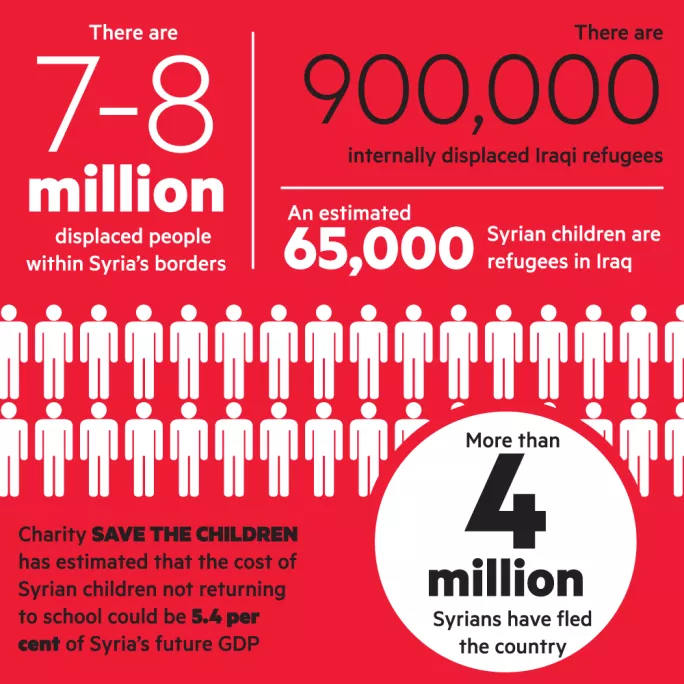How a new scheme is easing the plight of refugee teachers

Ask for a list of the needs of Syrian and Iraqi refugees fleeing war and Islamic State, and most will name food, clothes, blankets.
Few would be likely to name professional development. But helping refugee teachers to hone their professional skills in fact plays a significant role in ensuring their wellbeing.
A new scheme links Syrian and Iraqi refugee teachers in Kurdistan with a group of Latin-American teachers, who are providing online tutoring to help them deliver effective English lessons to displaced pupils.
“A huge focus has been on increasing access to education: building schools, recruiting teachers, finding books,” says Joel Bubbers, Syrian programme director at the British Council, which runs the scheme.
“There’s a huge desire to get as many kids into school as possible, but at some point you have to say that quality is as important - or nearly as important - as access. If children are going to get the full impact of education, then teachers have a real role to play.”
‘High-status job’
But, says David Pardoe, director of the British Council in the Kurdistan region of Iraq, the teachers have as much to gain as their pupils from this focus on professional development.
“In the Middle East, teaching is a high-status job,” he says. “You’re known in the community. You’re respected - you have a real profile.
“Often, they’ll have affluent backgrounds: nice houses, cars. We think of refugees in the poverty stereotype. But the teachers were quite a privileged, middle-class group, and they’ve lost all of that: self-esteem and their place in society.
“Continuing professional development makes them feel that they’re still valued as a teacher.”

These displaced teachers have been offered Skype tutorials by the Latin-American teachers, who work from a base in Argentina. They will then go on to teach English to refugee children in Iraqi Kurdistan.
“Most of the employers in the region are in the service sector,” Mr Pardoe says. “The service sector requires English as an absolute minimum. And the language of instruction in universities is English.
“But learning a language also gives you a sense of self-worth. It gives you a boost in confidence that helps you to overcome everyday challenges. That has tangible psychological benefits.”
Some refugee camps include fully functioning schools, staffed by trained teachers; other children receive very little education at all. Around 70 per cent of displaced children are taught in local schools. The refugee teachers will work with all three groups.
Fraught conversations
“You’ve got children with trauma,” says Mr Bubber. “You have conflict in the classroom. You have teachers needing a whole new skillset around trauma, child protection, dispute management.”
As a result, the Latin-American teachers, who come from Argentina and Colombia, had to reconsider their usual entry topics for language lessons.
For example, some of the Iraqi teachers - particularly those from occupied Mosul - fled leaving their family, friends and possessions behind as Islamic State took control. “They’re very, very worried about them,” Mr Pardoe says. “They are always on their mind.”
CPD makes them feel like they’re still valued as a teacher
This, therefore, made simple language-learning conversations about family members or the home particularly loaded.
“Teaching that kind of vocabulary might bring up some feelings,” says English teacher Johan Duarte. “It might be a problem. So we have to consider whether to include it or not.”
But, says Mr Pardoe, the Arab teachers welcome this opportunity for professional dialogue. “They were just amazed by the whole experience of being taught in real time by somebody sitting on the other side of the world,” he says. “A place that they could never imagine themselves visiting. It really opens up their horizons - it’s a bit of lightness in a dark situation.”
The Latin-American teachers, too, gained from the experience. “We discussed the cultural differences,” says Mr Duarte. “We LatinAmericans might be taken as warm - we tend to move a lot, to express a lot through our body. We thought that our body language might be inappropriate for them. But they didn’t have an issue with that.”
You need a Tes subscription to read this article
Subscribe now to read this article and get other subscriber-only content:
- Unlimited access to all Tes magazine content
- Exclusive subscriber-only stories
- Award-winning email newsletters
Already a subscriber? Log in
You need a subscription to read this article
Subscribe now to read this article and get other subscriber-only content, including:
- Unlimited access to all Tes magazine content
- Exclusive subscriber-only stories
- Award-winning email newsletters